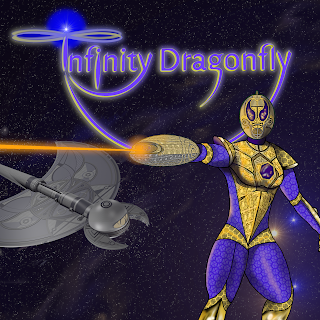Review: Antares
In the third cycle of Léo's Worlds of Aldebaran series which began with Aldebaran, followed by Betelgeuse, we are introduced to a trio of explorers who have been sent to the planet Antares 5. Their job is to document the environmental conditions, in particular the fauna and flora, as part of an assessment for potential colonisation. They make a troubling discovery: some strange phenomenon causes one of the native animals to vanish into thin air, a clear sign of the existence of a technologically advanced alien intelligence... yet no such aliens are in evidence. It remains a mystery, and - from the viewpoint of the Earth-based corporation which plans to invest heavily in the colonisation project - a very costly inconvenience. The planet is not a safe place for humans... but will such a concern sway those who are motivated by huge profit margins?
Meanwhile or heroine Kim Keller is relaxing on Earth after her strenuous adventures on Betelgeuse 6. Staying with a friend in Paris, on a polluted Earth, she is contacted by a representative of Forward Enterprises. They want her to join their proposed colonisation of Antares 5; a blatant exploitation of her popularity to create increased confidence in their brand. Kim is in no mood to go gallivanting off on yet another adventure on an unknown world, but is emotionally blackmailed into doing just that when the proposition is put to her that her friends Mark and Alexa - imprisoned for stealing a spacecraft in order to rescue her in the previous cycle - will be conditionally released and join her on the expedition. Mysteries lie ahead for our intrepid protagonists, and Kim also has a little secret of her own that she has yet to reveal...
If you enjoyed the first two cycles of Léo's grand opus, you will be in comfortably familiar territory here: high drama, rich worldbuilding, perilous journeys through frightening alien landscapes, struggles against corrupt and oppressive authorities, all blended expertly into a compelling narrative.
As before, the writer/artist brings us a whole bestiary of imaginative exotic animals, plus very stylish vehicle designs. He excels himself in this regard in the third cycle, creating a truly inspiring alien wonderland. So much popular science fiction leans mostly on action and thrills; it is much more rare to find a work that delights so much in sheer artistic inventiveness. There is more than a nod to the approach of Mœbius here, but Léo's creations are uniquely his own. There is nevertheless the same lovingly crafted originality that lifts this work above the mainstream. It is very satisfying to find a graphic novel that fully develops both the narrative and visual dimensions of the medium (as, ideally, they always should be); for both to be the creation of the same person is the mark of an exceptional talent.
In terms of the story, this is part of a greater arc which weaves the personal journeys of the main players in with grand themes of social development and the destiny of humankind. The perennially popular trope of questioning our race's readiness to participate in the affairs of the universe beyond our humble homeworld is never far from the focus. What constitutes a healthy, mature civilisation, though? Léo is unashamedly in the liberal camp when it comes to this conundrum; again religious orthodoxy raises its ugly head, in a not very thinly-veiled swipe at Islam and its traditional gender roles and restrictions. More than once the scientific experience of the (largely female) main characters wins out against the faith-based instincts of some (rather stereotypical) spiritual antagonists.
Antares covers new ground; although many themes are repeated from previous cycles the story as a whole is nevertheless moved forward with a few key revelations in store. Overall, for the reader this is a very rewarding stretch of the quest, with tantalising hints at more wonders to come in the next instalment.
Zak Webber
In terms of the story, this is part of a greater arc which weaves the personal journeys of the main players in with grand themes of social development and the destiny of humankind. The perennially popular trope of questioning our race's readiness to participate in the affairs of the universe beyond our humble homeworld is never far from the focus. What constitutes a healthy, mature civilisation, though? Léo is unashamedly in the liberal camp when it comes to this conundrum; again religious orthodoxy raises its ugly head, in a not very thinly-veiled swipe at Islam and its traditional gender roles and restrictions. More than once the scientific experience of the (largely female) main characters wins out against the faith-based instincts of some (rather stereotypical) spiritual antagonists.
Antares covers new ground; although many themes are repeated from previous cycles the story as a whole is nevertheless moved forward with a few key revelations in store. Overall, for the reader this is a very rewarding stretch of the quest, with tantalising hints at more wonders to come in the next instalment.
Zak Webber
Twitter - @sfcomicartist / Instagram - @sfcomicartist
JOIN US ON FACEBOOK! - SCI-FI COMIC NEXUS
*****
***
*




Comments
Post a Comment